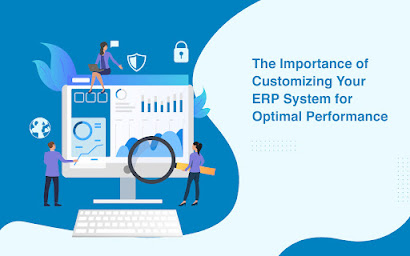Enterprise Resource Planning (ERP) systems are critical to the success of businesses in today's rapidly changing business environment. Implementing an ERP system is a significant investment, and businesses must ensure that they get the most out of this investment. One way to maximize the ROI of an ERP system is to customize it for optimal performance.
Customizing an ERP system or software is the process of adapting it to meet the unique needs of an enterprise. This can include modifying the system's functionalities, user interfaces, workflows, and data structures to align with the organization's business processes. Customization can be carried out in various ways, such as code-level customizations, add-ons, and plug-ins.
This blog post explores the importance of customizing an ERP system for optimal performance and how it can benefit businesses.
1. Aligning ERP Systems with Business Processes
Customizing an ERP system allows businesses to align their processes with its functionalities. When a business implements an ERP system, it should be aware that it is designed to support generic business processes. However, every organization has unique processes that differentiate it from its competitors. By customizing this system, businesses can optimize its functionalities to support their unique processes, thus increasing efficiency and productivity.
For instance, a manufacturing company may need to customize its ERP system to support its production processes, which may involve various stages such as inventory management, quality control, and assembly. Align with the manufacturing company's production processes, the system can provide real-time insights, minimize data duplication, and streamline workflow, leading to faster and more accurate decision-making.
2. Improving user experience and adoption
User adoption is critical to the success of an ERP system. If users find the system cumbersome and challenging to use, they will likely resist it, leading to low adoption rates. Customizing the ERP system can improve the user experience by making it more intuitive, user-friendly, and aligned with the users' needs.
Customization can involve:
Modifying the user interface.
Simplifying workflows.
Tailoring the system's functionalities to meet the users' specific needs.
This can lead to increased user satisfaction, which, in turn, can boost user adoption and maximize the ROI of the ERP system.
3. Supporting Data-Driven Decision Making
ERP systems provide a wealth of data that can be used to inform decision-making. However, to leverage this data, businesses need to customize their ERP systems to capture, store, and present the data in a way that aligns with their needs.
Customizing the ERP system can involve creating custom reports, dashboards, and analytics that provide real-time insights into business operations. This can enable businesses to make data-driven decisions, identify trends, and proactively address issues. For instance, a sales team can use the customized ERP system to track sales performance, identify top-performing products, and optimize pricing strategies to increase revenue.
4. Enhancing security and compliance
Customizing an ERP system can help businesses enhance security and compliance by adding additional security measures and controls. Every industry has unique regulatory requirements that businesses must comply with. Customizing the ERP system can help ensure that the system meets these requirements and that the data is protected against unauthorized access and manipulation.
Customization can involve adding additional layers of security, such as two-factor authentication, encryption, and access controls. This can help businesses safeguard sensitive data, such as customer information, financial records, and trade secrets.
5. Future-proofing the ERP System
Businesses are constantly evolving, and their needs change over time. Customizing an ERP system can help future-proof the system by making it more flexible, scalable, and adaptable to changing business needs.
Customization can involve adding new functionalities, integrating with third-party applications, and upgrading the system's infrastructure. This can add value to the ERP system over the long term, thus increasing the ROI of the investment.
For instance, a business may need to expand its operations to new markets, which may require additional functionalities such as multi-currency support, localization, and compliance with local tax laws. Customizing the ERP system can enable the business to scale up its operations without compromising its performance, ensuring that it remains relevant and valuable to the business over the long term.
Final Thought
Customizing an ERP system is a critical step in maximizing the ROI of the investment. By aligning the ERP system with the business's unique needs, customizing the user interface, and optimizing the system's functionalities, businesses can increase efficiency, productivity, and user adoption rates.
Customization can also enable businesses to leverage the wealth of data the ERP system provides to make data-driven decisions, enhance security and compliance, and future-proof the system. In today's fast-paced business environment, customizing an ERP system is essential for businesses that want to stay competitive and succeed in the long term.

Comments
Post a Comment